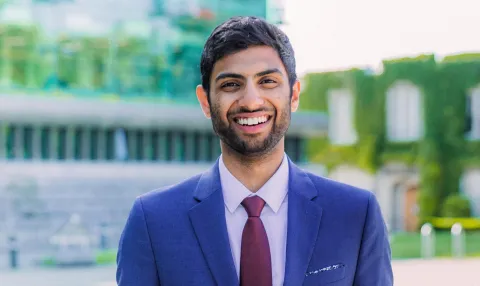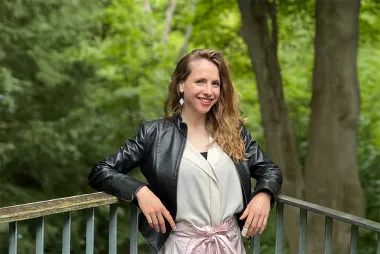“I think about my time at engineering as an evolving toolkit: Before I came into engineering, that toolkit was empty, but year after year, Integrated Engineering has helped me equip myself with one new tool at a time."

Pranav Menon
- Degree:
- Bachelor of Applied Science
- Grad year: 2019
- Program:
- Campus: Vancouver
If there’s one way to describe Pranav, it would be an intrapreneur — someone that is ridiculously passionate about using their entrepreneurial mindset to solve problems not just through startups or ventures, but also within organizations.
Throughout his five years at UBC, he has used that to guide all his decisions at UBC — from joining the Integrated Engineering Program, to creating a campus-wide peer-driven entrepreneurship support service through AMS Services (AMS eHub), to working at Microdermics (a medical device venture), to enabling entrepreneurial support for our faculty members working on impactful research, to coaching early stage startups at entrepreneurship@UBC and then finally, as a teaching assistant (TA) for APSC 100/101.
What has made your time at UBC Engineering the most memorable?
An experience that has always been very near and dear to my heart was my experience as a TA for APSC 100/101 — a course that equips first year engineers with the most critical design thinking and problem solving tools.
When I think about the most influential teachers that I’ve had in my life, I’ve come to realize that what made them exceptional was not what they taught me, but how they did it. I remember how they would come to class with so much passion and zest for life and learning — that it instantly facilitated such a meaningful and purposeful learning experience for me.
As an ASPC 100/101 TA, I’ve had the opportunity to bring that energy and facilitate a space that’s more than just absorbing content; it’s about learning how to embrace failure, break down complex ideas into simple solvable blocks, build creative solutions with very limited resources and most importantly, learning how to empathize!
What have you learned in engineering that is most valuable?
One of the most important lessons I’ve learned at engineering is: design your own unique narrative!
Towards the end of my third year, I remember having some serious imposter syndrome. At the time, traditional engineering jobs didn’t quite appeal to me, but since everyone around me was doing it, I very much felt less of an engineer.
That’s when it dawned on me: engineering is not about a career path, it’s about equipping yourself with a toolkit — one that you can use to solve problems that you deeply care about. Realizing that helped me completely redefine my understanding of what a career meant to me. It went from “How do I find a secure job?” to “How can I use what I’ve learned to help advance the impact that this company is looking to create?".
How do you feel a degree in engineering has benefitted you compared to a different field of study?
I think about my time at engineering as an evolving toolkit: Before I came into engineering, that toolkit was empty, but year after year, Integrated Engineering has helped me equip myself with one new tool at a time.
In my first year, that tool was learning how to build a community. In my second year, it was learning how to learn, and work with a high degree of uncertainty and lots of unknowns. In my third, it was how to think about any problem, break it down and build a product to help solve it. In my fourth, it was learning to trust my team and ask for help. And in my fifth and final, it was learning how to take it easy, efficiently manage my time and look out for my physical and mental health.
And now here I am, five years later with a wide set of tools — sharpened over the years — that I can use not only use in an engineering career, but for whatever problem or challenge that I’ll be facing in life. And for that, I have UBC Engineering to thank!
What has been your most memorable/valuable non-academic experience studying engineering at UBC?
Two years ago — while building AMS Entrepreneurship Hub (eHub) — I remember having some tea with Sophie and Caelen (two students from the Faculty of Arts). They had a deep burning desire to solve the excessive coffee cup consumption problem here at UBC — as all coffee cups have a plastic lining on the inner walls of the cup that prevent them from being recyclable. The only thing getting in their way was a lack of funds to get started.
A couple of months later, through a partnership I created with the Royal Bank of Canada (RBC) called RBC Get Seeded, Sophie and Caelen received a $500 grant to make their vision of reduced coffee cup consumption a reality. Since then, they’ve put countless reusable coffee cups in the hands of many students on campus through sold out pop-up-shops, and have been continuing to do so ever since.
That story is one of countless memorable stories I’m grateful to have supported through eHub. And it goes to show that you don’t need to be an engineer or a business student to be an entrepreneur. If there’s anything we’ve learned from them, it’s that if you deeply care about a problem and seek the right support, you can make it happen!
What advice would you give a student considering engineering?
Redefine your understanding of failure.
Two years ago, at an event, I remember asking a grade 12 high school student what failure meant to him. Without thinking, he responded “49 per cent.” Hearing that made me realize that ever since we were at school, we’ve defined our understanding of failure from a purely academic standpoint.
At UBC, you’ll slowly begin to realize that failure is going to happen a lot more often than you would like — and it's going to happen in all shapes and sizes. So, here’s my advice: when you’re faced with failure, instead of thinking, “Gosh, I’m such a failure.” rethink it to “Okay, you know what, I’ve failed. And that's okay. Now what? What can I can do to move forward and fix the situation?”. The more you train your brain to think in the latter, the more you’ll learn to embrace failure as an essential learning tool.
How will you go on to make a difference in our world?
My grand plan for making a difference in the world is actually quite simple: it’s to start small and make an impact on communities around me. One of my biggest joys in life is being an educator and enabling opportunities for others. And so, I’m going to make that difference by working for impact driven startups in Vancouver; continuing to coach early stage student startups, and as a result, help equip them with the entrepreneurial mindset; and finally, to continue to be a kind human being and offer support wherever I can.



